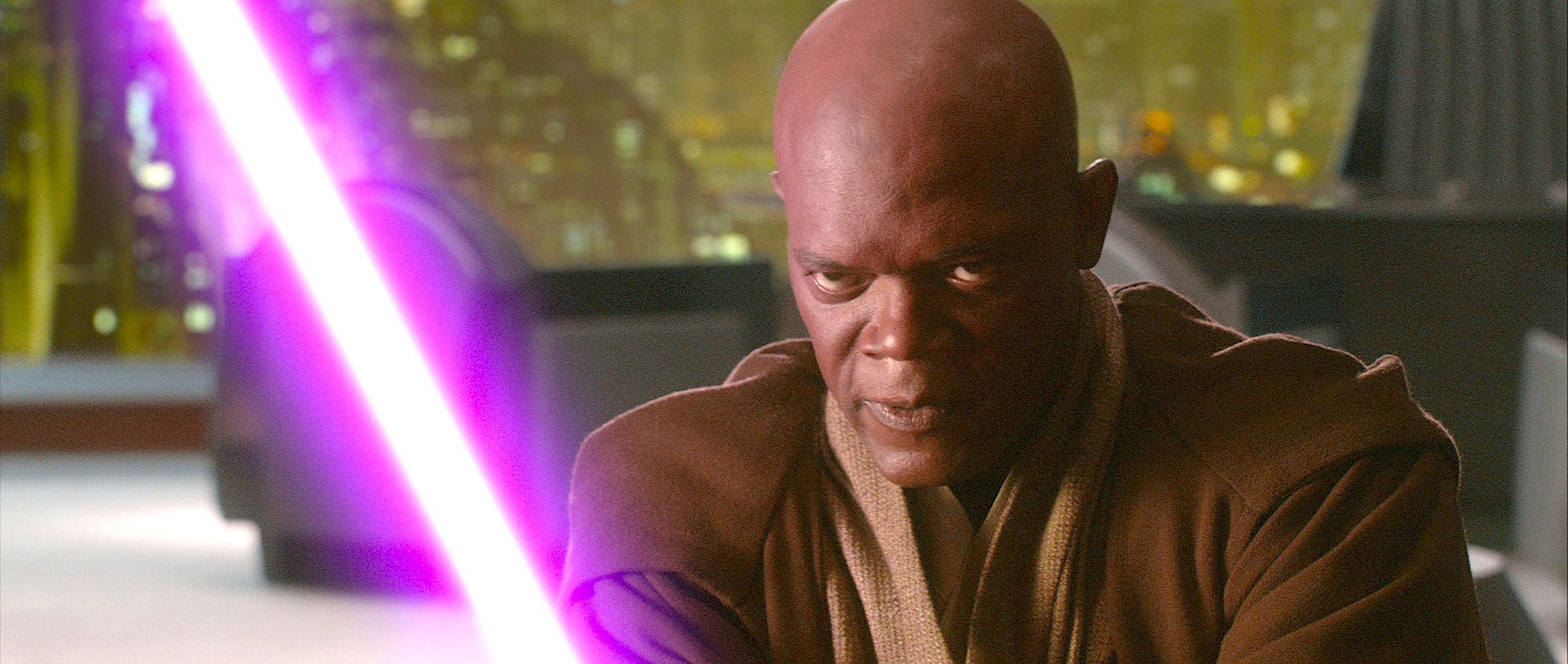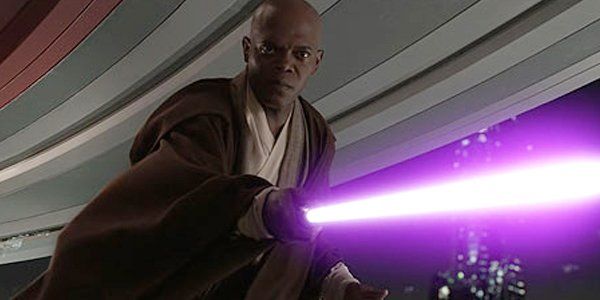I believed in you.
You the picture of composure. You
were my hero. The absitively, posolutely baddest-ass Jedi in all the land. All the galaxy. When you told Count Dooku, “This party’s over,”
I cheered. Here, I said, here
is proof that we can have the best of both worlds: that I can be a good man, the best
man, and still be cooler than Sith.
Oh Mace. What did you
do, fool.
In Revenge of the Sith, Chancellor Palpatine is revealed to us to be nothing less insidious than the Dark Lord and evil incarnate. Standing poised to deliver Palpatine the killing blow, Mace Windu, Senior Jedi Master of the Jedi High Council, has a choice to make: to kill or not to kill? Let’s review the facts. Mace has gone to Chancellor Palpatine’s office with the knowledge that he is the Dark Lord of the Sith, and has gone with the intent to arrest him.
Again: taking three
Jedi Masters with him, Master Mace Windu has gone to arrest the Chancellor
of the Republic because Mace has been convinced that the chancellor
is actually the Dark Lord Darth Sidious.
This intelligence is brought to Mace by none other than the Chosen One,
Jedi Knight Anakin Skywalker, the one who is destined to bring balance to the
Force (…or “So the prophecy says,” Mace snorts). Mace Windu, senior Jedi of the Jedi Council,
senses “a great deal of confusion” in Jedi Skywalker, and denies Anakin, boy of
destiny, his rightful place of prophecy in this epic confrontation.
Arguably his rightful place.
After all, difficult to interpret are prophecies, according to Yoda.
Mace and his Jedi troupe descend on Chancellor Palpatine in
the devil’s lair…his office. “In the
name of the Galactic Senate of the Republic,” Mace tells him, “you are under
arrest Chancellor… The senate will decide your fate.” The Dark Lord, of course, does not go
quietly. Mace successfully subdues the
Dark Lord, but three Jedi masters sacrifice their lives for the cause. Nevertheless, Mace, with his lightsaber at
Palpatine’s throat, cool as ever, reiterates, “You are under arrest, my lord.”
And we love him.
Despite all that he has gone through, witnessing his
comrades cut down before him, engaging the Dark Lord in a debilitating duel,
and perhaps most devastating of all, understanding that the Jedi have been
tricked into compromising their most cherished principles and become warriors
instead of peacekeepers for a totally made-up war, at this most desperate hour
Mace Windu reaffirms his mission to arrest the Dark Lord, and let
the Republic Senate decide his fate.
For the naysayers that complain that Anakin’s Fall in Revenge
is not illustrated acutely enough, that his fall to the dark side isn’t
convincing enough, I can’t help but cringe.
As the familiar adage goes, a person doesn’t judge good art; good art
strips you butt naked. Recall the
terrible moments of choice faced by Anakin in Episodes I and II. Remember Anakin’s tough decision to leave
Tatooine? (“I can’t do it, Mom, I just
can’t.”) Yet he does it. How about Anakin’s tough decision to go after
Dooku rather than Padmé after his true love gets tossed from a Republic
chopper? For those who have experienced
the primacy of free will, who have understood their past actions as events of
choice, who have in essence accepted responsibility as the craftsmen of their
own destinies and therefore for both the glory and misery of who and what they
are, the fall of Anakin Skywalker to the dark side in Revenge of the Sith
cannot cut out your soul with finer precision or more satisfying guilt.
When Padawan Anakin decides to take justice, government,
into his own hands and indiscriminately slay a community of men, women, and
children in Attack of the Clones, and when Master Mace stares into the
eyes of the devil, and in fear of a mere possible future, crumbles,
these are choices. “Cruel man,
nearsighted man! How can you say that?”
an averagely compassionate fellow says.
Let’s call him, I don’t know…“Lando.”
“Anakin just watched his mother die before his eyes!”
Lando says. “Mace Windu was trying to
kill the Dark Lord, Evil Itself, for the safety of a galaxy! Not the world, brother, a galaxy.”
I’ll get to “evil itself” in a minute. The great illusion here is the confusion of
justification in feeling a certain emotion – feeling hatred, fear, etc. – with
justification of acting on that emotion.
Is it natural to feel the impulse to chop some fools in half with a
lightsaber? Sure. But one certainly doesn’t need to. One always has a choice -- though, to face the
less attractive of those choices is often remarkably painful, and
therefore an individual will often eliminate it from the realm of possible
actions that can be taken. Thus creating
the perception, and familiar excuse, that “I had no choice.”
Right Lando?
Right Lando?
Right mindless clone troopers who backstabbed their Jedi generals? How about you self-serving Republic Senate, which applauded the government’s transformation into a dictatorship? Or at last Anakin Skywalker, who finally, finally, understands he has a choice when his son Luke tells him, “I feel the conflict within you. Let go of your hate!” and “I feel the good in you, the conflict.” Or in other words, “Yeah, Dad, you know that kinda nagging feeling you got inside? Yeah, that’s your conscience.”
Back to the action.
As Palpatine fries Mace with dark side lightning, Anakin, destined to be
present at this moment, bursts into Palpatine’s office, and Mace asks Anakin to
choose. Choose! he says, to
believe me or believe Palpatine! I
believe Mace would have been comforted more by Anakin choosing to help
Palpatine at that moment instead of what Anakin’s response is: indecision.
Of all the most excruciating experiences in life, uncertainty, in all
its forms, is the most agonizing. And
fear of uncertainty the most dangerous catalyst.
Not that we have anything to fear here, right Mace? Patience is a Jedi virtue, after all.
Right Mace?
We see the tension in Mace’s face in this pivotal moment as
a confused Anakin hangs onto his faith in the Jedi Order by a mere thread. Perhaps nothing can stop Anakin’s fall to the
dark side, perhaps he will become the greatest of Jedi. Both of these possibilities are as nothing,
for now there is only the reality of what happens, that is: when Anakin, the boy of destiny needed him
most, we see the good man who is Mace Windu come undone.
Consciously betraying everything he believes in, Mace at
last takes justice, government, into his own hands, announcing his decision
with these fatal words:
“I’m going to end this.”
And we love him.
As our hearts pound in our ears, not unlike the sound of
thunderous applause, we watch Mace pull back his lightsaber like a mallet,
scream down deep inside, “Yes! Yes, kill
him! KILL PALPATINE.” and watch lustily
as Mace unleashes the triphammer that will strike down the DARK LORD.
It’s fun to blame Palpatine, isn’t it? “Look,” we say. “See? There
is the root of all our problems. Not
you, or me. Certainly not me…” So-called evil incarnate. It’s fun and cathartic because we all have bad
days. Sometimes bad years, and sometimes
bad decades. Who wants to take the blame
for that? We all want stuff, the stuff
we don’t have. A toy… food… money.
A person?
To save a person, Anakin? To preserve an idea, Mace?
We wish and hope that with that one deft stroke, Mace will
forever end the intrusion of sadness and badness into our lives and usher in the age of
happiness and perfection not only that we all want but deserve. Detrimentally, so did Mace.
In one swift motion, Mace, who moments ago battered a Sith
Lord into submission and still reasserted his mission to arrest him,
ultimately betrays everything he and the Jedi believe in. Everything except this:
The Jedi will not lose.
And of course, the instant that prideful thought drives the
Jedi Master into motion, that final never-ending swing, the Emperor has already
won. As Mace strikes Palpatine the
deathblow, we know the principles of the Jedi Order are bankrupt, and the
Republic, democracy, is truly dead. ~ Abel G. Peña





No comments:
Post a Comment